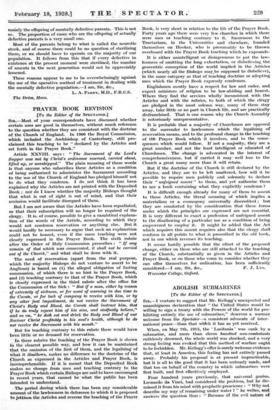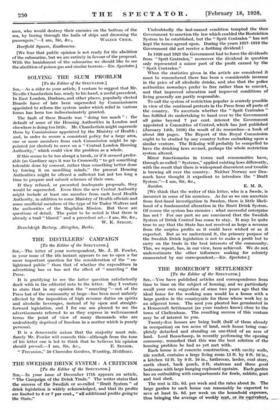ABOLISH SUBMARINES
[To the Editor of the SPECTATOR.] Sia,—I venture to suggest that Mr. Kellogg's unexpected and unambiguous declaration that " the United States would be willing to sign a treaty with the Powers of the world for pro- hibiting entirely the use of submarines," deserves a warmer welcome from the Spectator—a consistent advocate of inter- national peace—than that which it has as yet received.
When, on May 7th, 1915, the Lusitania ' was sunk by a submarine, and more than eleven hundred non-combatants ruthlessly drowned, the whole world was shocked, and a very strong feeling was evoked that this method of warfare ought to be forbidden. Mr. Kellogg's offer is surely welcome evidence that, at least in America, this feeling has not entirely passed away. Probably his proposal is at present impracticable, but it is all to the good that it has been seriously made, and that too on behalf of the country in which submarines were first built, and first effectively employed.
Four hundred years previously, that universal genius, Leonardo da Vinci, had considered the problem, but he dis- missed it from his mind with prophetic prescience : Why not describe my way of remaining under water ? " he writes, and answers "the qUestion thus " Because Of the evil nature of men, who would destroy their enemies on the bottom of the sea, by boring through the hulls of ships and drowning the Hartfield Square, Eastbourne.
[We fear that public opinion is not ready for the abolition of the submarine, but we are entirely in favour of the proposal. With the banishment of the submarine we should like to see the abolition of poison gas and similar horrors.—ED. Spectator.]







































 Previous page
Previous page